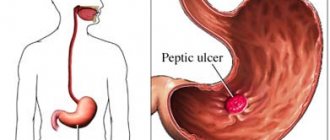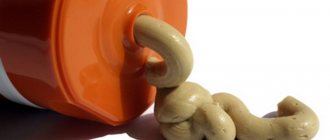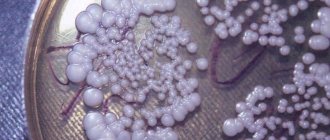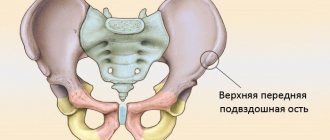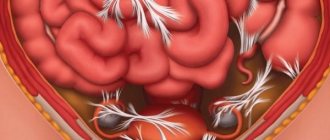Waiting for a new addition to the family is associated not only with joy, but also with the solution of numerous problems. The female body, subjected to additional stress, may malfunction during this period. For example, many expectant mothers experience bleeding from the anus during pregnancy. This is a common phenomenon that can occur due to a number of reasons, which determine the treatment regimen and choice of medications. Therefore, if such a problem occurs, you should immediately seek help from a medical facility.
Causes of bleeding
Before you begin to solve the problem, you should find out about the reasons why blood may appear from the anus in a pregnant woman. It is necessary to determine what the reason is; in a pregnant woman, the choice of therapeutic regimen depends on it.
Haemorrhoids
Enlargement and inflammation of hemorrhoidal veins, which form nodes near the rectum, are medically called hemorrhoids. This disease can develop due to systematic constipation. Hemorrhoids often provoke iron deficiency anemia. At this time, bloody streaks or bleeding from the anus may be observed in the stool of a pregnant patient.
Anal fissures
Anal fissure is another common reason for bleeding from the anus during pregnancy. This pathology is accompanied by pain, burning and itching during defecation.
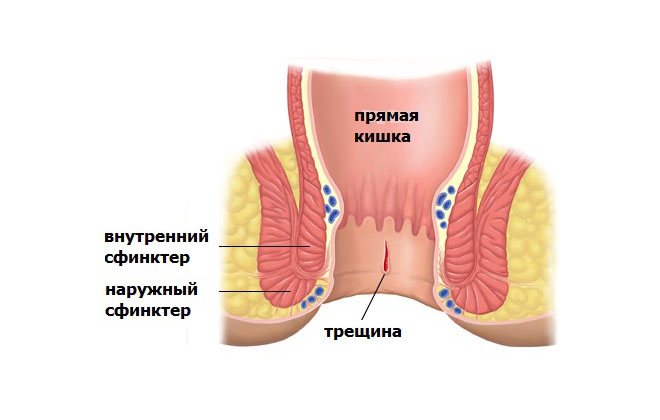
Inflammation
A disease accompanied by an inflammatory process in the rectal area is called proctitis. It is accompanied by increased frequency of bowel movements, discomfort in the anal area and bleeding from the anus. In late pregnancy, inflammation may increase.
Important information: Can uterine fibroids bleed and how to stop uterine bleeding
In addition, sometimes bleeding from the anus occurs without pain. This happens:
- with cancer of the rectal intestine;
- with diverticulosis;
- with gastritis;
- for duodenal and gastric ulcers;
- with ulceration of one of the sections of the gastrointestinal tract.
Most often, anal fissures and hemorrhoids are detected in pregnant patients.
Causes of blood in stool
Blood in the stool during pregnancy is an alarming sign, so you need to see a doctor for examination
Basically, blood in the stool during pregnancy appears due to pregnancy itself, that is, the cause is hormonal changes in the woman’s body, as well as physiological changes. The fetus grows, the uterus enlarges and provokes digestive disorders, in particular constipation. They, in turn, can cause hemorrhoids and rectal fissures.
The appearance of minor spots and traces of blood after defecation, accompanied by painful sensations, most likely indicates the presence of cracks in the rectum due to damage from solid feces. In this case, the blood is usually red and there is not much of it.
If the blood flows in a trickle, scarlet, and can appear both after visiting the toilet and in the intervals between them, then the cause may be hemorrhoids. It often occurs in pregnant women due to constipation, dilated veins and varicose veins associated with hormonal changes, excess weight of the pregnant woman and/or poor diet, large fetus or multiple pregnancy. Sometimes, before pregnancy, a woman did not even suspect hemorrhoids. It can disappear just as quickly after childbirth. Hemorrhoidal bleeding is dangerous if there is excessive bleeding.
A much greater health risk is the appearance of clots of coagulated dark blood in the stool, turning it dark or black.
Here it is necessary to immediately exclude as a reason the woman’s intake of special vitamins for pregnant women with an increased amount of iron against anemia. They color the stool black, but do not affect the smell or consistency. If the stool is black, liquid or tarry, with a strong unpleasant odor, there is reason to believe that its cause is bleeding from the upper parts of the digestive system. This can be a life-threatening condition and should be taken to hospital immediately.
Stool analysis
Dark-colored blood clots and changes in the color and composition of stool may appear with the following diseases:
- Polyps. Blood mixes with the stool and may remain red or form clots, depending on the location of the polyp(s).
- Proctitis. Ulcers on the rectal mucosa may bleed. In addition to blood, there is mucus in the stool.
- Colitis, Crohn's disease. It is characterized by liquid feces with blood and mucous masses.
- Peptic ulcer disease. The stool may be normal, but the amount of blood depends on the degree of ulceration and the location of the ulcers.
- Diverticula. These are formations in the form of a protrusion or pocket on the intestinal wall at the location of the blood vessels. When they are damaged, blood appears in the stool.
- Some systemic diseases can also be accompanied by the appearance of blood.
- Rectal cancer. This deadly disease has the same symptoms as bleeding due to polyposis.
These diseases and conditions in a pregnant woman can be extremely dangerous both for the mother and for the continued development of the fetus, therefore, when blood appears, undergoing an examination and treatment prescribed by a doctor is vitally important. When the life of the mother is at risk, the child sometimes has to be sacrificed, since the use of certain treatment methods, medications and surgery leaves him no chance of survival.
Is blood in the stool dangerous for the fetus during pregnancy?
If blood in the stool during pregnancy indicates the presence of massive internal bleeding, a serious illness, then the fetus can suffer in two ways - the loss of blood by the mother will affect its proper nutrition and development, and pain and a sharp deterioration in the mother’s health can lead to oxygen starvation and intrauterine death of the fetus , and also cause premature birth or miscarriage.
Even hemorrhoidal bleeding can be dangerous if it is too heavy. A large loss of blood will provoke loss of consciousness; by fainting, a woman can accidentally cause serious injury to herself or harm the fetus. Loss of blood will also negatively affect the health of the fetus - this can lead to oxygen starvation, damage to the lungs, nervous system and brain of the unborn child.
In most cases, such lesions have irreversible consequences.
If a pregnant woman detects blood in her stool and does not know about the potential sources of its occurrence (hemorrhoids, rectal polyps, constipation with fissures in the anus and rectum), then contacting a doctor should be mandatory.
You should also be alarmed by the appearance of a large amount of liquid scarlet blood, red and black clots, black liquid or unformed feces streaked with blood or with inclusions of particles of coagulated blood. All these signs can be indicators of very serious and dangerous diseases that can threaten both mother and child.
Useful video - Fecal occult blood test:
Read: Stool with white streaks in children and adults: causes and treatment of intestinal disease
We can say that any blood in the stool during pregnancy is an alarming sign. Even if these are isolated inclusions of blood streaks due to hemorrhoids during pregnancy or prenatal varicose veins, this may indicate a potential, hidden threat. A pregnant woman should not be lazy and go for an examination, if only to eliminate the risk of dangerous complications.
Treatment
If blood appears from the anus in women, you should not resort to self-medication. For this purpose, it is better to take tests (including a blood test) and contact a medical specialist who will accurately identify the root cause of the problem and prescribe adequate treatment.
If the anus is damaged or the hemorrhoids are inflamed, the doctor first stops the bleeding, and then prescribes ointments or suppositories for hemorrhoids, which are approved for use by pregnant women.
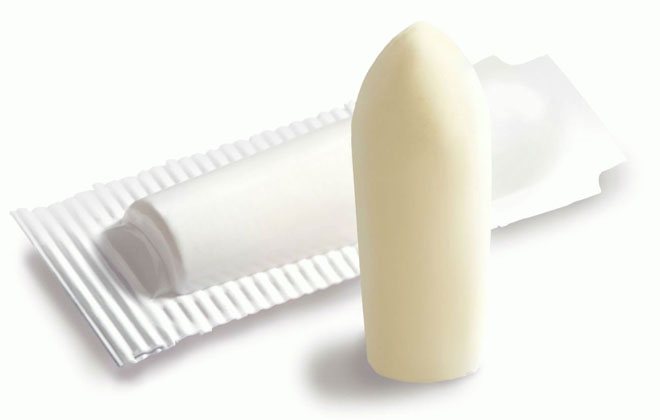
Other diseases are treated with gastroprotectors and anti-inflammatory drugs.
If bleeding begins suddenly, you should take a horizontal position and place a heating pad filled with cool water on the problem area. It is forbidden to fill it with ice, apply it to the perineum and keep it on the skin for more than half an hour.
If surgery is necessary, the specialist will first try to take steps to delay surgery until after birth.
Sometimes, when blood appears from the anus, immediate emergency assistance is required. You need to call doctors in the following cases:
- if the bleeding is intense and does not stop;
- if bloody vomiting is observed as a secondary symptom;
- if anal bleeding also causes hematomas, bruises and nosebleeds;
- if there is a deterioration in general health;
- if you experience abdominal pain and increased body temperature.
Important information: How to treat ulcer bleeding and what to do with a bleeding gastric (duodenal) ulcer
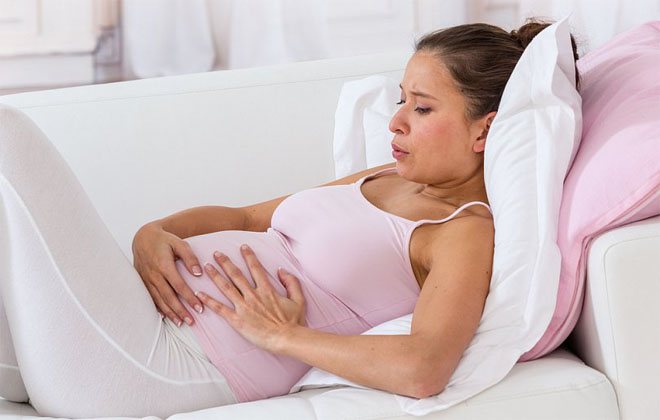
bloody stool during pregnancy
I’m writing here, I just want to speak out. I gave birth to my third son in August 2020. I gave birth, on the third day we were discharged home, it was Saturday. On Monday they called from the clinic and said that they needed to send blood from the heel, the so-called neonatal screening. We went They passed it, and the nurse said that if they don’t call in a month, then everything is fine. Four days later, while having breakfast, I felt something and for some reason I started reading about the bad tests of this screening, and literally after lunch they called me and told me to urgently run to the clinic. I don’t remember how I dressed the baby and how I rushed to this hospital, wiping tears from my eyes. I ran and the pediatrician told me that a bad test had come back for the most terrible diagnosis of Cystic Fibrosis. I had never heard anything about this disease before, the doctor said it was urgent we need to go and retake it, the next day we went and took this test again, but it turns out the second time we had to take it on the 21st - 28th day, but we passed it on the 13th. And they called us from Genetics and invited us to an appointment. Of course, I had read a lot about This diagnosis and my whole life ended, people in our country with such a disease do not live long, and the way they live is of course difficult and the caregivers need a lot of money and strength. I cried all day and night, I don’t remember how we lived for 4 months Son, I lived automatically. We went to genetics for a sweat test, there the doctor reassured me, they did the test and the result turned out to be borderline. My life in general was getting better. And they also found a large amount of fats and fatty acids and mucus in the child’s stool, and this is a direct sign of cystic fibrosis. I stopped living at that moment, and ran out of the hospital without remembering myself, but before that we took blood for the genetics of this disease, and we had to wait two months. These two months, I washed this poop every day, and I felt that they were fat, I licked the child from head to toe, because the first sign is salty sweat, and as luck would have it, the child’s forehead was salty and his head too. I cried and lost weight, didn’t eat anything, and was still breastfeeding, I I turned out to be a weak mother. I prayed every day, and everyone went and prayed that the tests would come back good. Of course, there are more than 2000 mutations in cystic fibrosis, and we were taken to the most common ones in our region. While we were waiting for this test, we were invited again for sweat test, since it is done three times. The baby still had mucus and neutral fat in his stool, we went to the gastro, we were prescribed Creon. The day of the sweat test came, we went to the geneticist, while the sweat test was being done, I burst into tears. And I prayed and prayed. So I looked at the device where the result was given, and when I saw that we had the norm, I screamed with happiness, but the geneticist said that I still needed to do one more and let me go for another month. Of course, this month is again in a fog , washing poop, licking the baby’s forehead and whole body. The day of the third test came, we went, everyone prayed, and the result was good, everything was within normal limits. I cried with happiness, my grandmother was sobbing in the corridor, then we waited for the genetic test, in one day on the phone I saw a call from a geneticist, my legs gave way, I was afraid to pick up the phone, and I picked it up and the doctor said that the test was clear. Lord, I thanked God so much, I cried over my son and sobbed. In general, we were left on the register until he was a year old. Almost two years have passed, but the fear remains for the rest of my life, any sneeze or sniffle makes me panic. Thank God, everything is fine with my son, the diagnosis was removed, and the stool was restored, we just turned out to be allergic to cow’s milk protein and that’s why we had all the problems with the intestines. Once I removed all the milk, everything got better. But I can’t describe what I went through. It was hell. While I was pregnant, I planned a photo session with baby Newborn, but because of everything that happened to us, of course we didn’t They did. I have aged very much in a year. But the most important thing is that my child is healthy and we do not have this terrible diagnosis. I wish everyone never to hear this terrible disease addressed to them. Health to everyone, health to the children. Thank you.
Prevention
Constipation is the most common cause of hemorrhoids and anal fissures. Women need to take all measures necessary to prevent such a problem. To avoid bleeding from the anus, you should follow these recommendations:
- The daily diet must be supplemented with foods that contain large amounts of fiber. It is found in abundance in fresh vegetables and fruits, whole grain bread, and cereals. You can make porridge by adding wheat bran.
- You need to drink as much water as possible. Every day you need to drink 8-10 mugs with a volume of 200-250 g. Vegetable and fruit juices are also welcome. To prevent constipation and bleeding from the butt, prune juice is the most useful.
- To prevent bleeding from the anus, moderate but regular physical activity is required. Swimming, yoga and walks in the fresh air are more suitable for pregnant women.
- It is undesirable to delay the act of defecation when the desire to empty the intestines appears.
- In some situations, pregnant women use iron supplements, which can also cause prolonged constipation. It is not recommended to use such products without first consulting a doctor.
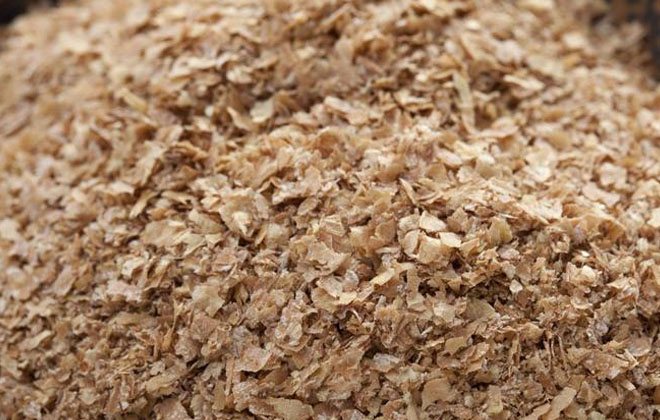
To prevent hemorrhoids you need to take the following measures:
- Experts recommend their patients to use the Kegel exercise. The muscles in the vaginal area are tensed and held in this position for 8-12 seconds. The exercise must be repeated 20-30 times. This complex helps stabilize the blood supply to organs located in the pelvis.
- Alternating compresses with different temperatures. If hemorrhoids appear, you can try applying alternately warm and cold compresses to the problem area. This allows you to get rid of discomfort.
- You should use soft and natural toilet paper that does not contain any fragrances or other synthetic additives.
Important information: How to stop uterine bleeding during menopause in elderly women and what to do to treat heavy discharge
Anal bleeding during pregnancy is easier to prevent than to treat. A balanced diet and a healthy lifestyle ensure that this problem will not bother you either during pregnancy or after childbirth.
List of possible pathologies
Blood in the stool during pregnancy can be caused by:
- severe constipation;
- hemorrhoids;
- anal fissures;
- colitis;
- proctitis;
- polyps;
- diverticula;
- benign or malignant formations in the intestines.
Is there little blood in the stool during pregnancy and is dark in color? Perhaps it was constipation that caused her. In this case, it appears only during bowel movements, and is explained by excessive pushing. Such bloody inclusions are the result of rupture of small capillaries.
Hemorrhoids are inflammation and enlargement of the veins in the rectum. During pregnancy, it develops due to impaired elasticity of the walls of blood vessels caused by increased levels of progesterone. With this ailment, the blood is bright red, and the discharge in the form of drops may continue for some time after bowel movement. If bleeding is profuse, it causes anemia.
Scarlet blood in the stool during pregnancy may indicate the appearance of anal fissures. In this case, the act of defecation is accompanied by severe sharp pain. When urine or feces particles come into contact with the damaged area, an unpleasant burning sensation is felt. Cracks appear due to rupture of the mucous membranes during the passage of dry feces, as well as injury during anal sex. The acute form of the disease resolves independently in every second patient; a chronic process requires long-term treatment.
With colitis, the stool is liquid and contains inclusions of not only blood, but also mucus. This disease is caused by the appearance of ulcers on the intestinal mucosa. There is no pain during defecation; malaise is accompanied by rumbling in the stomach and bloating. The urge to defecate appears at non-specific moments - immediately after eating, while walking, bending or squatting. Feces have a pungent odor due to the development of bacterial microflora.
Proctitis is an inflammation of the rectal mucosa. It may be a consequence of tuberculosis, syphilis, gonorrhea, as well as unfinished treatment of other diseases. A characteristic symptom is increased frequency of stools (both dry and liquid), pain, and the presence of lumps of mucus.
Diverticula are protrusions in the walls of the colon. With age, the risk of the disease increases; It is rare in women giving birth under 30 years of age. The main cause is poor nutrition, frequent self-medication with medications, and past infections of the digestive tract. Diverticulosis is often asymptomatic and requires long-term treatment and diet adjustments.
What to do?
Bloody feces during pregnancy require immediate medical attention. Diagnosis may require blood and stool tests, as well as special procedures:
- Colonoscopy is an examination of the inner surface of the large intestine, which is carried out using an endoscope. The results are visible to doctors on the screen - if polyps are found, they can be removed immediately. The examination is quite unpleasant, but its pain largely depends on the competence and experience of the specialist. To relieve any fear, talk to your doctor before the procedure.
- Irrigoscopy is an X-ray examination of the large intestine. Safe only in early pregnancy. To carry it out, a contrast agent is injected into the rectum using an enema. Then an image is taken to identify pathologies.
Further treatment depends on the nature of the disease. If the cause of its occurrence is excessive consolidation of the stool, the woman is prescribed a mild laxative and a special diet. For hemorrhoids, suppositories, ointments and creams are used. More serious pathologies are treated only under the supervision of a doctor.
